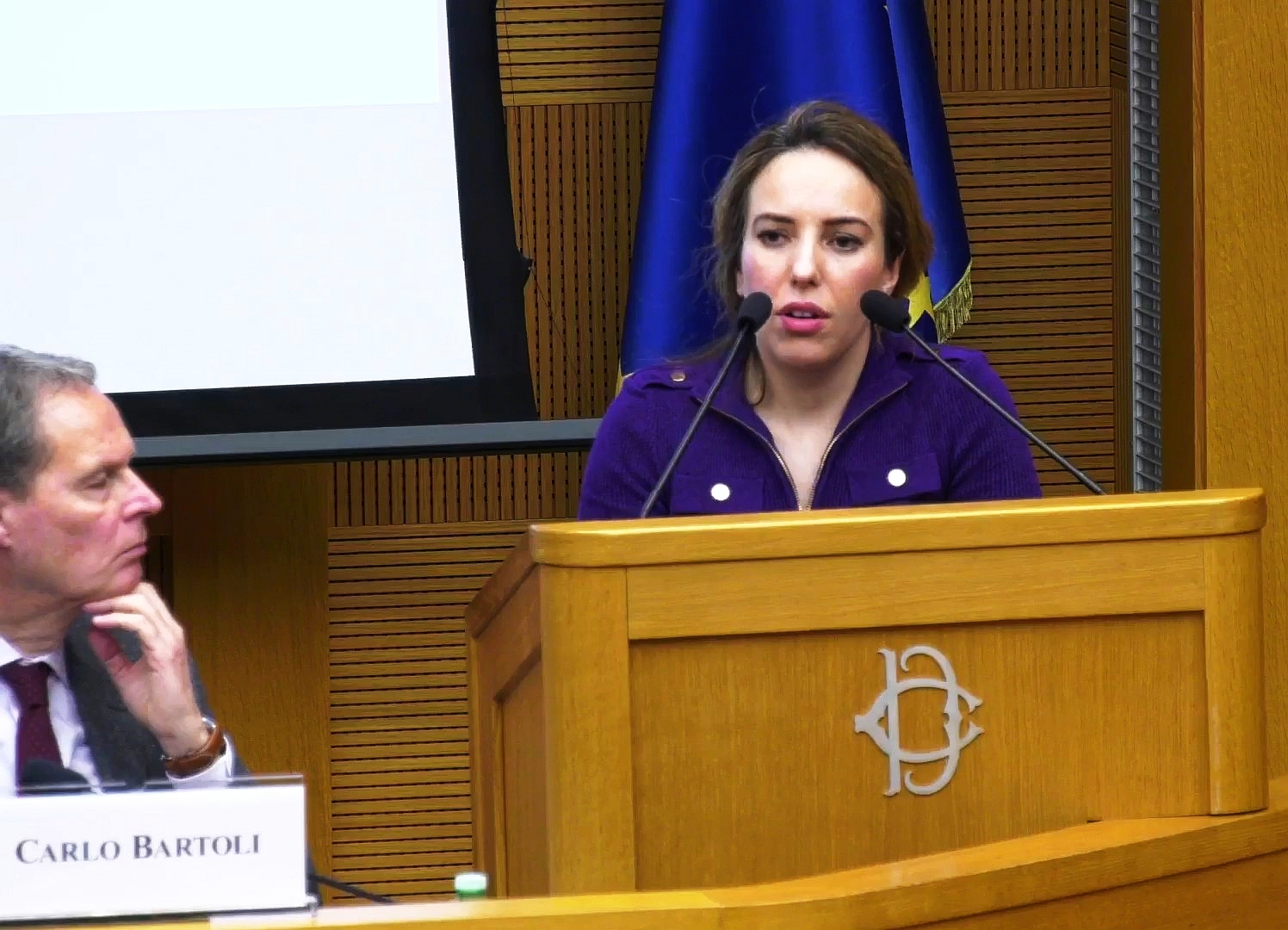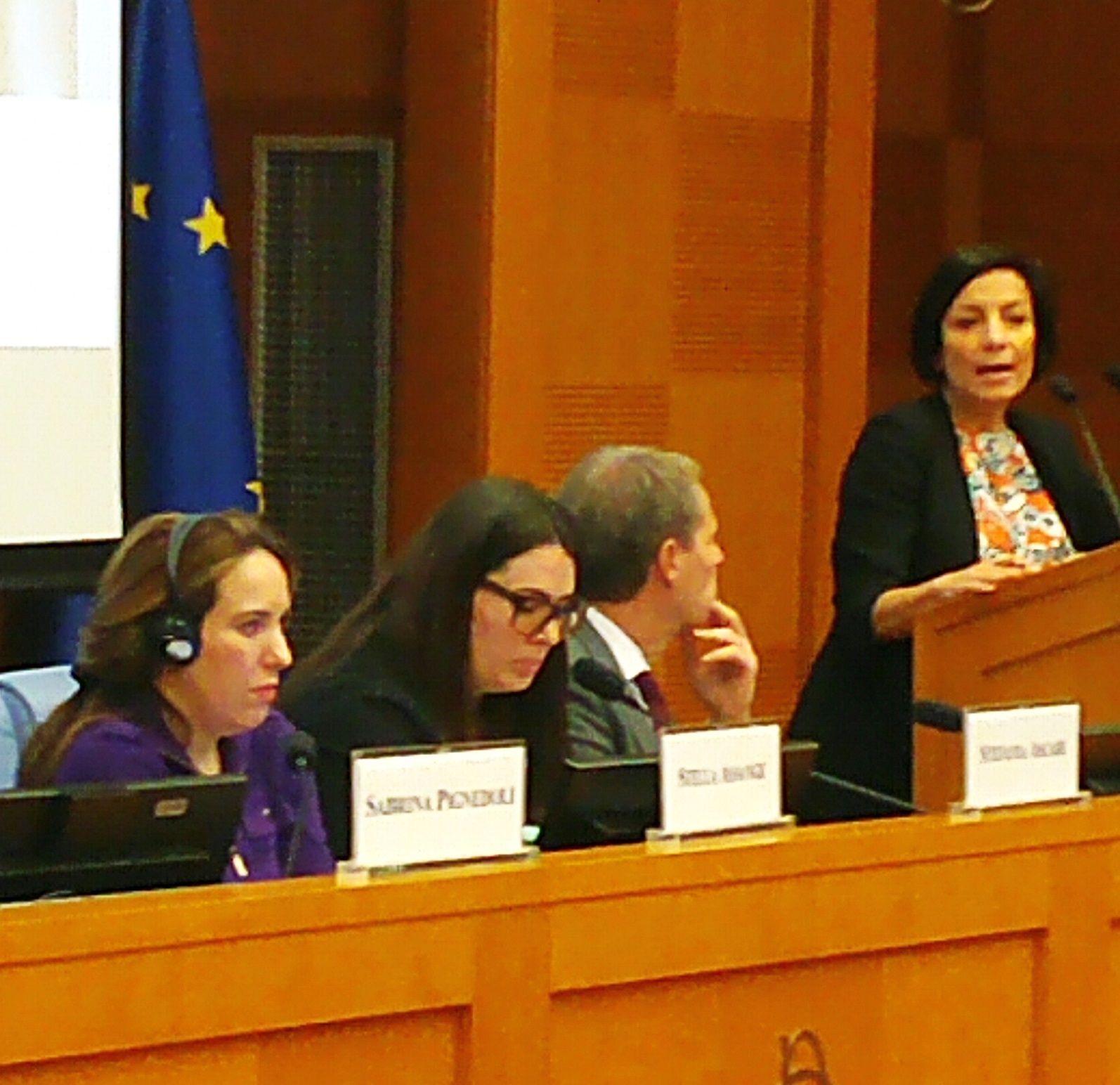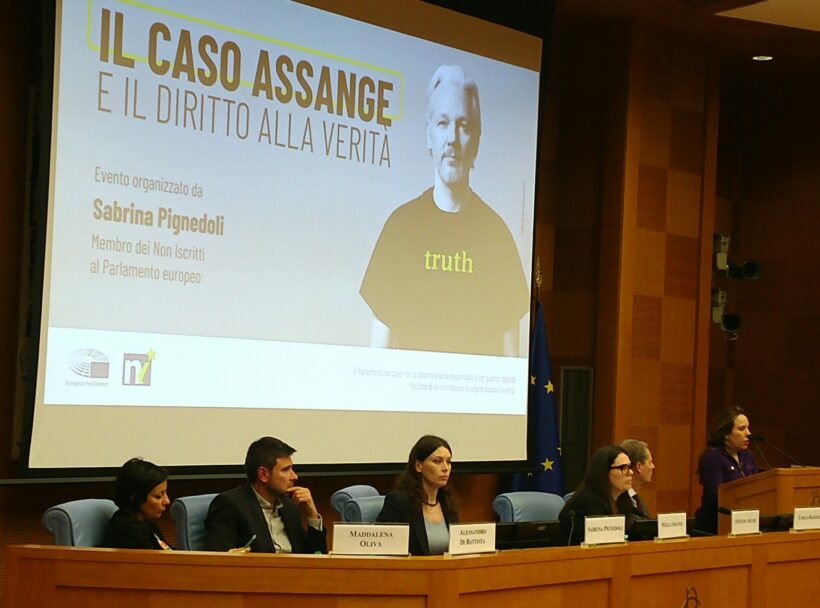Stella Moris Assange sounds the alarm for all those who practice journalism with a conscience. As well as for all those who rely on them to stay informed. The Powers-that-be want to blindfold and gag not only Julian Assange but also Free Speech and our very #RightToKnow.
The Parliamentary Groups Hall next to Montecitorio was packed last Tuesday (March 7, 2023) to hear Stella Moris, partner of WikiLeaks co-founder Julian Assange, explain how Julian’s relentless judicial persecution is, in fact, “an attack on freedom of the press.”
“It is a signal,” Stella said, deliberately intended by the Powers-that-be “to discourage other journalists from doing as he did,” a signal that lays bare “what Power will resort to.” Europe therefore has a duty to “take concrete steps in defense of Julian Assange” to save “freedom of the press and free speech.”
The 39-year-old lawyer – and champion of human rights – made her appeal as part of an encounter on “The Assange Case and our Right to Truth” promoted by the European Parliamentarian Sabrina Pignedoli with the collaboration of the Italian Parliamentarian Stefania Ascari. It brought together, alongside Stella, the President of the National Order of Journalists, Carlo Bartoli, the popular journalist and former Parliamentarian Alessandro Di Battista, and Maddalena Oliva, deputy editor of the widely-read daily Il Fatto Quotidiano. In the audience, besides the well-known investigative journalist Stefania Maurizi, author of the best-seller on the Assange case The Secret Power, were dozens of personalities from the world of journalism, politics and grass-roots associations, as well as hundreds of ordinary citizens brandishing “Free Assange” badges. “Julian’s battle is battle that should engage all of us,” Hon. Pignedoli began, summing up the purpose of the encounter.
Carlo Bartoli then took the floor, announcing that the National Order of Journalists will bestow on Julian Assange an honorary membership card. “We are here to defend not only the cause of a man unjustly imprisoned but also to defend a principle: freedom of information.” To counter the lie that Assange was a bad journalist/editor who leaked documents without carefully vetting them, Bartoli asserted that the opposite was true: he praised Assange’s WikiLeaks site precisely because, with great care, it “expunges all information that could put someone in danger.”

Carlo Bartoli and, right, Stella Moris Assange, Photo: Press Service, Chamber of Deputies
Alessandro Di Battista then took the floor inflaming the audience. “If Assange were to die in prison,” he said without mincing his words, “among those responsible would be the many journalists who today stay silent in order to safeguard their bank accounts, their careers, their media space, thereby transforming themselves into lugubrious custodians of Accepted Truths and no more.” The former Member of Parliament for the Five-Star Movement acknowledged as a positive sign, however, that the party he once belonged to, initially pro-Assange and then ever more reticent, “is now taking up Julian’s cause again: that’s good news, indeed.”
The inhibiting effect on journalism intended by the Powers-that-be in persecuting Julian, and which Stella Assange blasted in her speech, has – unfortunately – already become a reality, asserted the deputy editor of the daily Il Fatto Quotidiano, Maddalena Oliva. “How many articles get squashed every day!” she exclaimed, and not only in Italy. Two journalists from her newspaper were recently expelled from Ukraine because their reports did not find favor with the Zelensky government; but what is even more sinister is the fact that their colleagues did not even dare to report the scandal in their Italian newspapers, perhaps for fear of getting implicated. The award-winning U.S. journalist Seymour Hersh was recently ganged up on by his fellow American journalists for having claimed that the U.S. was involved in destroying the North Stream pipeline (an act of war) last Sept. 26. “There is a climate of imposed silence and when that happens,” Oliva concluded, “we are all complicit, we freedom-loving journalists first and foremost.” It is as though we lacked the courage to “ask that extra question.”

From left: Stella Moris Assange, Stefania Ascari, Carlo Bartoli, Maddalena Oliva. Photo: Patrick Boylan
However, there still remains a glimmer of hope for Freedom of the Press and Free Speech: Stella Assange recalled how, last November, some of the world’s major newspapers – The New York Times, The Guardian, Le Monde, El Pais and Der Spiegel – broke their complicit silence by signing an appeal to President Biden calling for Assange’s release.
Then, last January 27, Newsweek magazine, a U.S. news outlet that prides itself on representing the consensus in the country (“neither too far to the left nor too far to the right”), published a lengthy article by Shaun Waterman based on an in-depth interview with Stella Assange. The great empathy and compassion evident in the article is something new in the United States, where, for more than a decade, Julian has been the victim of a defamatory witch hunt – far more vicious than in Europe – to discredit him in the public eye.
Great empathy and compassion also mark the review, which appeared in the Los Angeles Times last March 2 by Robert Abele, of the Ben Lawrence film Ithaka, describing the efforts of Julian’s father, John Shipton, to free his son. After expressing the usual reservations about Julian, Abele states, “But his being targeted for extradition by the United States, to be tried here… under the Espionage Act — a conviction under which would guarantee maximum security imprisonment for the rest of his life — is something that should chill the blood of journalists everywhere, whether you consider Assange a journalist or not. Simply for being a publisher, his prosecution is a threat to democracy.”
The U.S. Establishment seems to be awakening to the danger. (Or reawakening: the LA Times did sound the alarm initially back in 2019.) And grassroots groups in the U.S. have been demonstrating everywhere for Julian’s release, even in front of the White House.
Recalling Pignedoli’s words, Stella Assange concluded the meeting by emphasizing how Julian’s plight “is a political case, not a legal one; the solution therefore must be political. The UK has got Julian; the US wants to get him; between the two, Europe must intervene to say enough is enough and to save him. Each of you opinion makers can contribute to his release by making your voices heard… now.”
In other words, it’s time to act!










